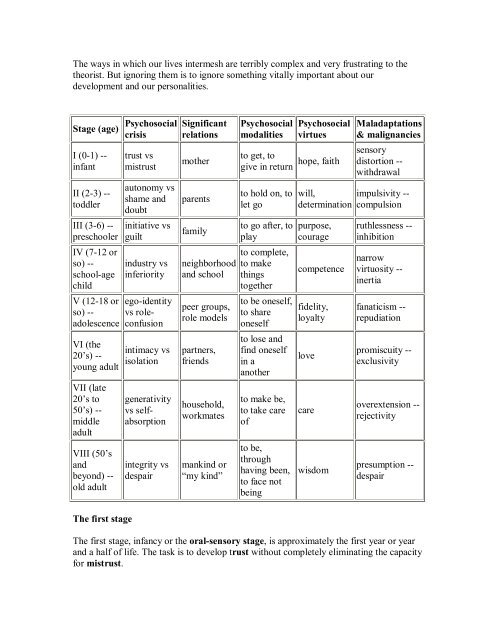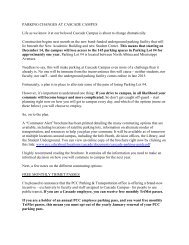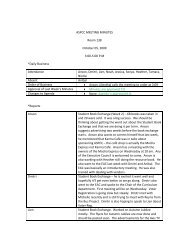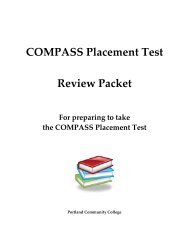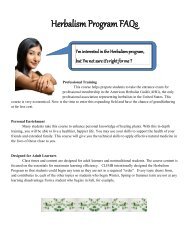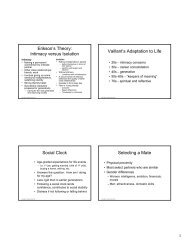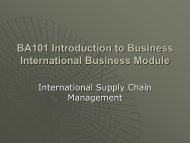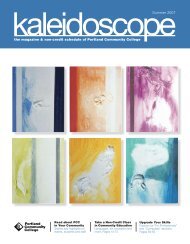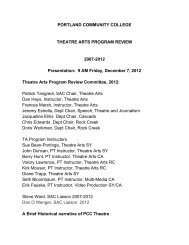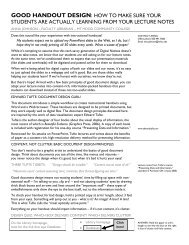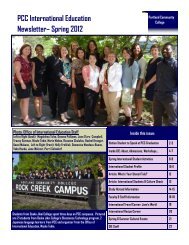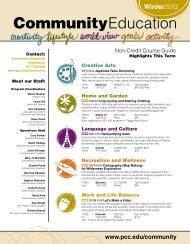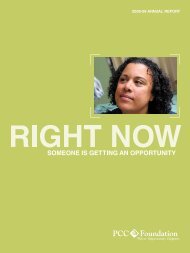erik erikson - pcc - Portland Community College
erik erikson - pcc - Portland Community College
erik erikson - pcc - Portland Community College
You also want an ePaper? Increase the reach of your titles
YUMPU automatically turns print PDFs into web optimized ePapers that Google loves.
The ways in which our lives intermesh are terribly complex and very frustrating to the<br />
theorist. But ignoring them is to ignore something vitally important about our<br />
development and our personalities.<br />
Stage (age) Psychosocial<br />
crisis<br />
I (0-1) --<br />
infant<br />
II (2-3) --<br />
toddler<br />
III (3-6) --<br />
preschooler<br />
IV (7-12 or<br />
so) --<br />
school-age<br />
child<br />
V (12-18 or<br />
so) --<br />
adolescence<br />
VI (the<br />
20’s) --<br />
young adult<br />
VII (late<br />
20’s to<br />
50’s) --<br />
middle<br />
adult<br />
VIII (50’s<br />
and<br />
beyond) --<br />
old adult<br />
trust vs<br />
mistrust<br />
autonomy vs<br />
shame and<br />
doubt<br />
initiative vs<br />
guilt<br />
industry vs<br />
inferiority<br />
ego-identity<br />
vs roleconfusion<br />
intimacy vs<br />
isolation<br />
generativity<br />
vs selfabsorption<br />
integrity vs<br />
despair<br />
Significant<br />
relations<br />
mother<br />
parents<br />
family<br />
neighborhood<br />
and school<br />
peer groups,<br />
role models<br />
partners,<br />
friends<br />
household,<br />
workmates<br />
mankind or<br />
“my kind”<br />
Psychosocial<br />
modalities<br />
to get, to<br />
give in return<br />
to hold on, to<br />
let go<br />
to go after, to<br />
play<br />
to complete,<br />
to make<br />
things<br />
together<br />
to be oneself,<br />
to share<br />
oneself<br />
to lose and<br />
find oneself<br />
in a<br />
another<br />
to make be,<br />
to take care<br />
of<br />
to be,<br />
through<br />
having been,<br />
to face not<br />
being<br />
Psychosocial<br />
virtues<br />
hope, faith<br />
sensory<br />
will,<br />
determination<br />
purpose,<br />
courage<br />
competence<br />
fidelity,<br />
loyalty<br />
love<br />
care<br />
wisdom<br />
Maladaptations<br />
& malignancies<br />
distortion --<br />
withdrawal<br />
impulsivity --<br />
compulsion<br />
ruthlessness --<br />
inhibition<br />
narrow<br />
virtuosity --<br />
inertia<br />
fanaticism --<br />
repudiation<br />
promiscuity --<br />
exclusivity<br />
overextension --<br />
rejectivity<br />
presumption --<br />
despair<br />
The first stage<br />
The first stage, infancy or the oral-sensory stage, is approximately the first year or year<br />
and a half of life. The task is to develop trust without completely eliminating the capacity<br />
for mistrust.


